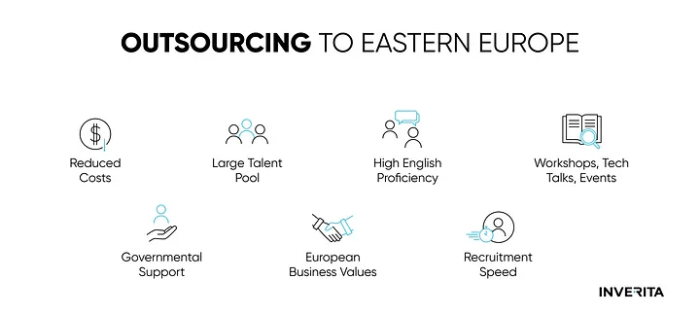Eastern Europe has rapidly emerged as a significant player in the global software development landscape. Boasting a large pool of highly skilled engineers, competitive pricing, and a thriving tech ecosystem, the region attracts businesses worldwide seeking cost-effective and high-quality software solutions. This article delves into the intricacies of software development in Eastern Europe, exploring its strengths, challenges, and future prospects.
The Rise of Eastern European Software Development
Several factors have contributed to the rise of Eastern Europe as a software development hub. Firstly, the region boasts a strong educational foundation in mathematics, computer science, and engineering. Many Eastern European universities offer rigorous technical programs, producing a steady stream of talented graduates proficient in various programming languages and technologies. This strong educational base forms the bedrock of the region’s tech talent pool.
Secondly, the cost of living and labor in many Eastern European countries remains significantly lower than in Western Europe or North America. This translates to lower development costs for businesses outsourcing their projects, making it a highly attractive proposition. Finally, the region has witnessed substantial government investment in its technology infrastructure and initiatives to foster innovation, further stimulating growth in the sector.
Key Countries and Their Strengths, Software development in eastern europe
- Ukraine: Known for its expertise in web development, mobile app development, and game development. A large and skilled workforce contributes to its prominent position. However, recent geopolitical events have significantly impacted the industry.
- Poland: A strong focus on software engineering, particularly in areas like embedded systems and fintech. Poland boasts a mature IT sector with a large number of established companies and a growing startup scene.
- Romania: A growing hub for IT outsourcing, particularly in areas such as software testing, IT support, and custom software development. A large pool of English-speaking developers is a significant advantage.
- Belarus: Traditionally strong in game development and software engineering, but recent political developments have created significant uncertainty.
- Czech Republic: A focus on enterprise software development and IT services. Known for its high-quality engineering and a strong focus on innovation.
- Hungary: Growing strength in the development of automotive software and other embedded systems.
Technologies and Expertise
Eastern European developers demonstrate proficiency across a wide range of technologies. Popular languages include Java, .NET, Python, PHP, JavaScript, and C++. Furthermore, the region boasts significant expertise in various development methodologies, including Agile, Scrum, and Waterfall. Many companies specialize in specific niches, such as:
- Web Development: Building and maintaining websites and web applications using various frameworks and technologies.
- Mobile App Development: Creating applications for iOS and Android platforms using native, hybrid, or cross-platform frameworks.
- Game Development: Developing video games for various platforms, utilizing game engines like Unity and Unreal Engine.
- Data Science and Machine Learning: Utilizing data analysis and machine learning algorithms to solve complex problems.
- Cloud Computing: Developing and deploying applications on cloud platforms like AWS, Azure, and Google Cloud.
- Cybersecurity: Developing and implementing security solutions to protect systems and data.
Challenges and Considerations
While Eastern Europe offers numerous advantages, businesses should be aware of potential challenges. These include:

Source: cloudfront.net
- Geopolitical Risks: The region’s geopolitical landscape can be volatile, impacting stability and project timelines. Businesses should carefully assess the risks associated with specific countries.
- Communication Barriers: While English proficiency is generally high, communication challenges can still arise. Clear communication protocols and project management strategies are crucial.
- Time Zone Differences: Collaborating across time zones requires careful planning and coordination to ensure effective communication and project progress.
- Talent Acquisition and Retention: Competition for skilled developers is increasing, requiring businesses to offer competitive compensation and benefits packages.
- Intellectual Property Protection: Businesses should ensure robust contracts and security measures to protect their intellectual property.
The Future of Software Development in Eastern Europe
The future of software development in Eastern Europe appears bright. Continued investment in education and infrastructure, coupled with a growing pool of skilled developers, positions the region for sustained growth. The increasing adoption of new technologies, such as AI and blockchain, further fuels innovation and creates new opportunities. However, addressing the challenges mentioned above will be crucial for maintaining the region’s competitive edge.
Frequently Asked Questions (FAQ): Software Development In Eastern Europe
- Q: What are the average costs of software development in Eastern Europe? A: Costs vary significantly depending on the project’s complexity, the developer’s experience, and the specific country. Generally, costs are lower than in Western Europe or North America.
- Q: How can I find reliable software development companies in Eastern Europe? A: Research online directories, review platforms, and industry publications. Look for companies with proven track records, positive client testimonials, and a clear understanding of your project requirements.
- Q: What are the common communication methods used in Eastern European software development projects? A: Common methods include email, video conferencing, project management software (e.g., Jira, Asana), and instant messaging platforms (e.g., Slack).
- Q: What are the legal considerations when outsourcing software development to Eastern Europe? A: Ensure you have a legally sound contract that addresses intellectual property rights, payment terms, and dispute resolution mechanisms. Seek legal counsel if necessary.
- Q: What are the cultural considerations when working with Eastern European developers? A: Be mindful of cultural differences in communication styles, work ethics, and business practices. Open communication and mutual respect are crucial for successful collaboration.
References
- Statista (for market data and statistics)
- Clutch (for reviews and ratings of software development companies)
- [Add other relevant sources here]
Call to Action
Ready to leverage the talent and cost-effectiveness of Eastern European software developers? Contact us today to discuss your project requirements and explore how we can help you build high-quality software solutions.

Source: cubeduel.com
Question & Answer Hub
What are the most popular programming languages used in Eastern European software development?
Java, C++, Python, and JavaScript are among the most prevalent, reflecting global trends but also incorporating regional specializations.
What are the major tech hubs in Eastern Europe?
Key hubs include Warsaw (Poland), Kyiv (Ukraine), Prague (Czech Republic), Budapest (Hungary), and Minsk (Belarus), each with its own unique strengths and specializations.
Are there cultural differences to consider when working with Eastern European developers?
While generally professional and collaborative, clear communication and understanding of cultural nuances regarding directness and communication styles can enhance project success.
What are the typical project management methodologies used?
Agile methodologies, such as Scrum and Kanban, are widely adopted, reflecting global best practices in software development.
